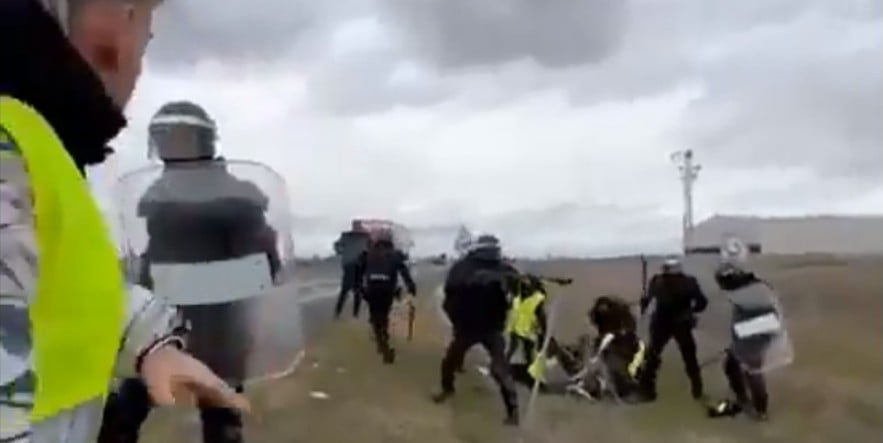Spanish police fire rubber bullets at farmers’ protests near Madrid

On Friday afternoon, March 8, 2024, Spanish police used rubber bullets and tear gas against farmers who protested in the province of Ávila, northeast of Madrid. This is just the latest in a series of violent clashes between farmers and police taking place across Europe over the past couple of months.
According to EFE, 80 Civil Guard agents used rubber bullets and tear gas against some 75 farmers who blocked a section of an important highway in the Spanish province of Ávila, northeast of Madrid.
The Subdelegation of the Government of Ávila reported that the intervention of the law enforcement forces took place due to the “resistance” and the “defiant” attitude of the protesters, who had not formally informed the authorities about their plan to block the highway.
The authorities justified their actions by stating that the safety of citizens was at serious risk due to the protests. They added that there were no injuries reported in these clashes.
The video below purportedly captures the incident. The presence of several protesters lying on the ground and the sound of people screaming raises questions, especially given reports that no injuries occurred during the confrontation.
Spanish police shoot rubber bullets at peaceful farmers as they protest the deliberate destruction of their livelihoods being waged under the banner of Net Zero and Agenda 2030. pic.twitter.com/ZxYU86CrcD
— Wide Awake Media (@wideawake_media) March 11, 2024
At the heart of the European agricultural unrest are several key issues. Import policies, particularly concerning large volumes of Ukrainian imports for which the EU has waived quotas and duties, have become a focal point of contention.
Farmers in countries like Poland and the Czech Republic argue that these imports undercut local prices while not adhering to the EU’s stringent environmental standards. This situation is exacerbated by the renegotiation of trade deals, such as those with the South American bloc Mercosur, which has stoked fears of further market imbalance in critical agricultural commodities like sugar, grain, and meat.
New subsidy rules requiring a portion of farmland to remain fallow and bureaucratic hurdles at both the national and EU levels have compounded the sense of crisis among farmers. Issues such as the “suffocating bureaucracy” emanating from Brussels have been particularly highlighted by Spanish farmers, pointing to a broader dissatisfaction with the EU’s agricultural policy framework.
Energy costs, particularly diesel fuel, represent another significant strain, with proposals to phase out subsidies or introduce taxes on agricultural diesel sparking protests in Germany and France.
These economic pressures are situated within a broader context of dwindling farm incomes in many EU states, aggravated by policies aimed at curbing food inflation at the expense of producers.
The protests are not merely economic in nature but also reflect deeper grievances related to the EU’s environmental regulations and the global competitive environment.
Farmers across the bloc are calling for less regulation and more support in facing international competition, with specific criticisms directed towards environmental policies perceived as overly burdensome. For instance, the EU’s push for reduced pesticide use has been met with resistance, highlighting the tensions between agricultural practices and the EU’s environmental objectives.
Many farmers say they feel marginalized by policies that label them as environmental polluters or animal abusers. This sentiment has fueled a broader movement demanding not only regulatory and financial relief but also a reevaluation of the agricultural sector’s role within the EU’s socio-economic and environmental framework.
References:
1 Guardia Civil española dispara pelotas de goma y gases lacrimógenos contra agricultores – Notitarde – March 10, 2024
2 Why are farmers protesting in Europe, what are governments doing? – Reuters – Febraury 28, 2024
3 Why are farmers across Europe protesting? – DW – February 26, 2024
Featured image credit: Wide Awake Media (stillshot)

Drive farmers from their land for any purpose and only one thing follows….starvation.